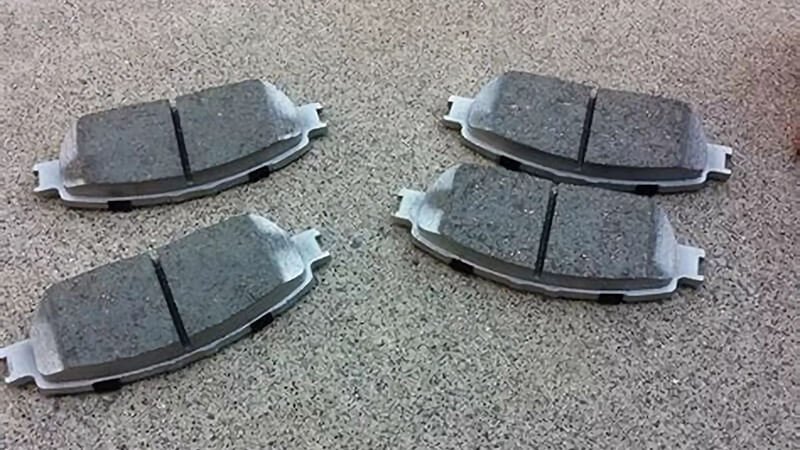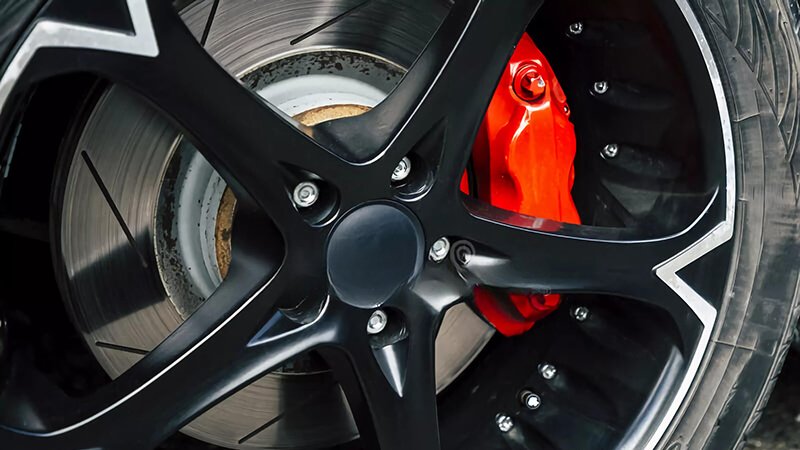Overheating brake pads are a common problem that many drivers face, and they can significantly affect the performance of your vehicle. Understanding why this happens and how to address it can save you from more serious issues like brake failure. But why exactly do brake pads heat up, and what should you do about it?
Brake pads overheat primarily due to aggressive driving, such as frequent hard braking or extended braking on downhill slopes. This excess heat can lead to issues like brake fluid boiling and reduced braking efficiency. However, choosing the right brake pads can prevent this problem.
Understanding the causes of brake pad overheating is just the first step. Let’s dive deeper into what you can do to prevent and fix this issue, ensuring your vehicle’s braking system operates at its best.

What to Do if Brake Pads Overheat?
If you find that your brake pads are overheating, it's essential to act quickly to prevent damage to your vehicle and maintain your safety. So, what steps should you take if you notice that your brake pads are excessively hot?
When brake pads overheat, the first thing you should do is pull over safely and allow the brakes to cool down. Avoid driving aggressively and check the condition of the pads. Upgrading to high-performance brake pads can also help prevent future overheating.
When brake pads1 overheat, it’s a warning sign that there’s something wrong with your vehicle’s braking system. The first step is to safely pull over and allow the brakes to cool. Continuing to drive with overheated brakes could cause further damage and even lead to brake failure.
Steps to Take if Brake Pads Overheat
| Action | Description | Reason for Action |
|---|---|---|
| Pull Over | Safely stop your vehicle at the side of the road | Prevents further damage to the braking system2 |
| Allow Cooling | Let the brake pads cool naturally | Reduces the risk of brake fade and fluid boiling |
| Inspect Brake Pads | Check the pads for wear or damage | Worn-out pads may be causing excessive heat |
| Avoid Hard Braking | Reduce speed and avoid aggressive braking | Prevents the buildup of heat in the system |
| Upgrade to Performance Pads | Consider replacing with high-performance pads | Improves heat resistance and braking efficiency |
While the brakes are cooling, it’s crucial to examine the condition of the brake pads. If they are excessively worn or damaged, it’s time to replace them. Overheating can cause permanent damage to the pads, resulting in reduced effectiveness and even rotor damage.
Additionally, consider upgrading to high-performance brake pads3, like those offered by Runex Auto. These pads are designed to withstand higher temperatures and provide consistent braking power, even under extreme conditions. By making this switch, you can prevent the issue of overheating from happening again in the future.

Is It Normal for Brake Pads to Get Hot?
Heat is an inevitable byproduct of braking, but how much heat is too much? Is it normal for brake pads to get hot, or should you be concerned if you notice excessive heat build-up?
It is normal for brake pads to get hot during braking, as friction generates heat. However, excessive heat—leading to issues like brake fade or a spongy pedal feel—can indicate a problem. This can be due to driving style, pad wear, or insufficient cooling.
Brake pads are designed to handle some level of heat. In fact, heat is an essential component of the braking process as it helps to generate the necessary friction for stopping the vehicle. However, there is a difference between normal heat and excessive heat. Normal braking heat will typically not cause noticeable changes in braking performance, but excessive heat can result in brake fade4, reduced performance, and even safety issues.
What Causes Brake Pads to Get Too Hot?
| Cause | Description | Impact on Brake Pads |
|---|---|---|
| Frequent Hard Braking | Sudden or repeated heavy braking | Increases the amount of heat generated |
| Driving Downhill for Long Distances | Prolonged braking on steep slopes | Prevents the brakes from cooling, leading to excessive heat |
| Worn Brake Pads | Thin pads create more friction, raising temperatures | Leads to excessive heat5 buildup and reduced braking performance |
| Poorly Ventilated Brakes | Inadequate air flow through the brake components | Prevents heat dissipation, causing pads to overheat |
| Using Low-Quality Pads | Pads made from low-quality materials | Poor heat resistance, leading to premature overheating |
One of the primary reasons brake pads overheat is due to aggressive driving. For example, when driving downhill for extended periods, drivers may be forced to continuously apply the brakes to maintain control of the vehicle. This constant friction causes heat to build up in the pads, which can lead to the boiling of brake fluid and, in some cases, brake fade.
In such cases, opting for high-performance brake pads6, like those from Runex Auto, can provide a solution. Our brake pads are designed with advanced materials that resist heat buildup and maintain their performance even under the most demanding conditions.

How Do You Fix Hot Spots on Brakes?
Hot spots on your brake pads can significantly affect braking performance, but how can you address this issue? Fixing hot spots is crucial for maintaining the efficiency and safety of your braking system.
Hot spots on brake pads occur when certain areas of the pad become excessively worn or heated. To fix this, you can either resurface the brake pads or replace them altogether. High-performance brake pads can also reduce the occurrence of hot spots.
Hot spots on brake pads are a common issue that can drastically reduce braking efficiency. These spots occur when a portion of the brake pad wears unevenly or becomes too hot, causing that area to become less effective. If left unchecked, hot spots7 can result in vibrations, decreased braking power, and premature pad wear.
How Hot Spots Form
| Cause | Description | Impact on Brake Pads |
|---|---|---|
| Uneven Brake Rotor Surface | Rotors with grooves or imperfections | Causes uneven pressure on the brake pad, leading to localized overheating |
| Worn or Low-Quality Brake Pads | Poor material quality or excessive wear | Results in more friction in certain areas of the pad, leading to hot spots |
| Aggressive Braking | Frequent hard braking generates more heat | Increases the likelihood of hot spot formation |
To fix hot spots, the first step is to ensure the brake rotors are smooth. If the rotors are uneven, they need to be resurfaced. Resurfacing the rotors restores their smoothness and allows for even pad contact. If the hot spots persist despite resurfacing, it’s time to replace the brake pads.
Investing in high-performance brake pads8 is a long-term solution to hot spots. These pads are engineered to distribute heat more effectively, reducing the chances of uneven wear and hot spot formation.

What to Do When Brakes Get Hot?
When your brakes get hot, it can lead to serious performance issues. Knowing what to do in these situations is crucial for maintaining safety and preventing damage to your braking system.
When your brakes get hot, you should immediately reduce speed and pull over to allow them to cool. If the problem persists, check the condition of the brake pads and consider switching to higher-quality pads for better heat resistance.
When brakes get hot, it’s essential to act quickly. Prolonged heat can cause brake fade9, where the braking power significantly diminishes, making it harder to stop your vehicle. To prevent this, the first step is to reduce speed and avoid hard braking. Once you’ve safely pulled over, allow the brakes to cool before continuing your journey.
Steps to Take When Brakes Get Hot
| Action | Description | Reason for Action |
|---|---|---|
| Reduce Speed | Slow down gently to reduce braking force | Prevents further heat buildup in the system |
| Avoid Hard Braking | Use light and consistent braking | Prevents additional heat from building up |
| Pull Over | Find a safe place to stop and cool the brakes10 | Allows the brakes to cool down naturally |
| Check Brake Pads | Inspect the condition of the pads for wear | Identifies if worn pads are the cause of the overheating |
| Upgrade to High-Performance Pads | Install brake pads designed for high-temperature conditions | Reduces the risk of overheating in the future |
By following these steps, you can minimize the damage caused by hot brakes and prevent long-term wear. It’s also important to use high-quality parts, like Runex Auto’s performance brake pads, that are specifically designed to withstand extreme temperatures and provide consistent braking power.

Conclusion
Brake pad overheating is a serious issue that can affect your vehicle’s safety and performance. By understanding the causes and taking preventive measures, like choosing high-performance brake pads11 from Runex Auto, you can ensure your vehicle's braking system works effectively under all conditions. Regular maintenance, careful driving, and high-quality parts are the keys to preventing brake pad overheating.
-
Explore this link to find top-rated brake pads that can withstand high temperatures and improve your vehicle's braking performance. ↩
-
Understanding the braking system is essential for maintaining safety; this resource will provide in-depth insights into its mechanics. ↩
-
Discover the advantages of upgrading to high-performance brake pads to enhance your vehicle's braking efficiency and safety. ↩
-
Learning about brake fade is crucial for ensuring your vehicle's braking system remains effective and safe. ↩
-
Understanding the impact of excessive heat on brake pads can help you maintain vehicle safety and performance. ↩
-
Discovering the advantages of high-performance brake pads can enhance your vehicle's braking efficiency and safety. ↩
-
Understanding hot spots is crucial for maintaining vehicle safety; this link provides insights into their impact on performance. ↩
-
Explore this link to discover top-rated brake pads designed to minimize hot spots and enhance braking efficiency. ↩
-
Understanding brake fade is crucial for safe driving. Explore this link to learn more about its causes and prevention methods. ↩
-
Cooling the brakes properly is vital for vehicle safety. Find expert tips on how to do this effectively. ↩
-
Getting your best auto solutiion and your brand OEM brake pads price. ↩













